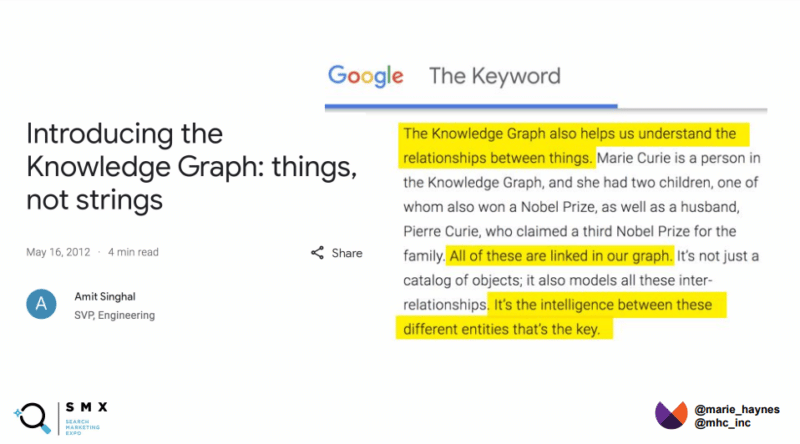“E-A-T – expertise, authoritativeness, and trustworthiness – has become a buzzword,” said Dr. Marie Haynes, CEO of Marie Haynes Consulting Inc., in her presentation at SMX Advanced. “E-A-T is Google’s attempt to figure out which businesses and individuals are authentic.”
Despite working in search marketing for many years, Haynes noted she only recently thought about the ways semantic search – information retrieval in which both the contextual meaning and the intent of a query are taken into consideration – could improve a site’s E-A-T. Her time spent digging into the Quality Raters’ Guidelines (QRG) helped make this connection.
Contrary to what some believe, E-A-T is not a single ranking factor, but rather a collection of signals Google uses to determine what content is high-quality and useful for searchers. And, according to Haynes, semantic search knowledge can help marketers optimize sites for this rating system.
“A lot of the things we’ve been saying Google can do can be explained with semantic search capabilities,” she said. “Semantic [search] relies on understanding the meaning of words, and we’ve seen how proud Google has been in their advancements in understanding language.”
Semantic search and its relation to E-A-T
Google’s Hummingbird algorithm, which rolled out in 2013, was designed to revamp the way the search engine understands and ranks content. With an improved understanding of intent at its core, the update helped Google better evaluate the authoritativeness of sites through semantic search.
“Hummingbird was a change to Google’s engine, and when it happened, few SEOs knew about it,” Haynes said. “It gave Google’s algorithms the capacity to incorporate semantic search.”

Before Hummingbird was implemented, Google was largely a lexical search engine, dependent on keywords. These search engines primarily focus on retrieving documents that contain these keywords, using PageRank to establish a hierarchy along the way. And while these mechanisms are still in play, the addition of semantic search has changed the game.
“You can have lexical search and you can have semantic search together,” Haynes said. “We don’t know exactly how Google is using the combination of these, but we know that back in 2013 when Hummingbird came out, they started to have the capability of doing it well.”
SEOs would be wise to study the changes Hummingbird ushered in, especially when it comes to the search engine’s understanding of language.
Using semantic search and knowledge retrieval to improve E-A-T
Semantic search’s knowledge retrieval capabilities can help marketers improve the E-A-T of their content. According to Haynes, this is due to Google’s Knowledge Graph.
“Knowledge search gathers information from a richly structured database,” she said. “The best example we have of this is Google’s Knowledge Graph.”

The Knowledge Graph helps marketers understand the relationship between entities. By optimizing sites according to entities and their relationships (rather than focusing solely on one keyword and its variants) SEOs can make it easier for Google to relate your content to established entities in its Knowledge Graph.
“I’ve been fascinated by the way Google can use entities in its Knowledge Graph,” Haynes said. “We’ve been making recommendations based on what’s written in the QRG – trusting that somehow Google could algorithmically accomplish these things. What we were really doing was improving E-A-T based on a knowledge of semantic search.”
“When you’re improving Google’s understanding of the entities associated with your business, that’s improving your E-A-T,” she added.
Watch Marie Haynes’ full SMX Advanced presentation
Not registered for SMX Advanced? Get your free pass here.
Already registered for SMX Advanced? Log in here.
The post How to improve E-A-T with semantic search appeared first on Search Engine Land.
via Search Engine Land https://ift.tt/6csAtP4

No comments:
Post a Comment